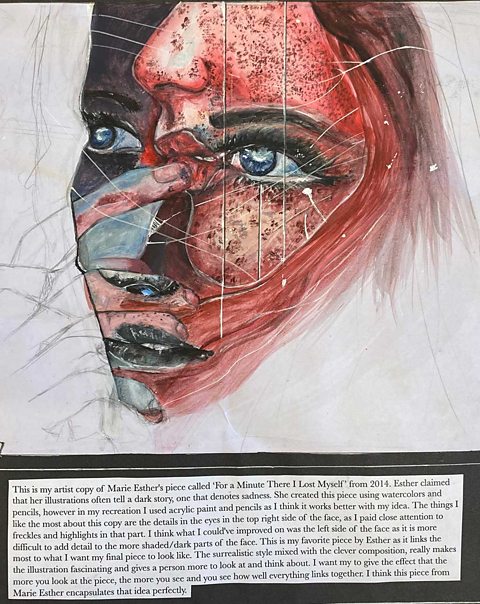Evaluating expressive work

Student's analysis
There are a number of approaches to use for evaluating expressive work. For example:
- You might comment on studies and experiments by adding annotationA note written to explain or comment on an image or other piece of work throughout your work.
- Your teacher might provide a template for you to collect your thoughts on evaluating your work.
Whatever your method of evaluation, it should answer questions about your sources of artistic inspiration, your own expressive ideas and your reflections on your process and the development of your work.
The following questions can be used as a guide.
Artist and their work:
- Who were your chosen artists, art movementA group of artists or designers from the same time period whose work had similar aims and/or similar characteristics. Examples include Impressionism, Art Deco and Bauhaus. and artworks?
- What are your opinions of these artworks and how did they influence you?
- What did you learn about the way the artists used materials and techniqueThe method used to create something, eg cross-hatching is a technique used to create tone in a drawing. to communicate their ideas?
- In what ways did social influenceAn event which had an impact on an artwork or design. For example the bombing of a town during the Spanish Civil War inspired Picasso to paint тАШGuernica.тАЩ and cultural influenceA cultural event which had an impact on an artwork or design. For example, the Impressionist movement had an impact on the Post-Impressionists. impact on the artworks?
- How did you use aspects of this knowledge in your own work?
Your expressive ideas:
- What was the theme of your project?
- What subject matterThe topic or objects chosen for representation in an expressive artwork. In portraiture, the person represented is referred to as the тАШsubjectтАЩ or тАШsitterтАЩ., materials and techniques did you select?
- How did you develop and improve your compositionArrangement of different elements within an artwork or design. ideas?
- What were the challenges and how did you respond to them?
Review and reflect on your development process:
- What do you think about your development work?
- How well did you respond to your theme?
- How did your work change through the project?
- How did your skills develop during the project?
- What would you do differently in the future and why?
Review and reflect on your final piece:
- How have you used formal elements such as line, toneTone generally describes how dark or light something is. It can also mean a colour created by mixing a pure hue with grey., colour and shape?
- What materials did you use, and why? Did they work successfully?
- What meaning and messages did you want to convey and were you successful?
- What is your opinion of your final piece? What elements do you think are successful and why?
- What would you do differently in the future and why?
More guides on this topic
- Finding inspiration - OCR
- Responding to stimuli - OCR
- Analytical drawing - OCR
- Developing ideas - OCR
- Creating a design brief - OCR
- Experimenting with materials and techniques - OCR
- Recording and observing - OCR
- Annotating your work - OCR
- Assessment objectives and presenting your work - OCR
- Externally set assessment - OCR